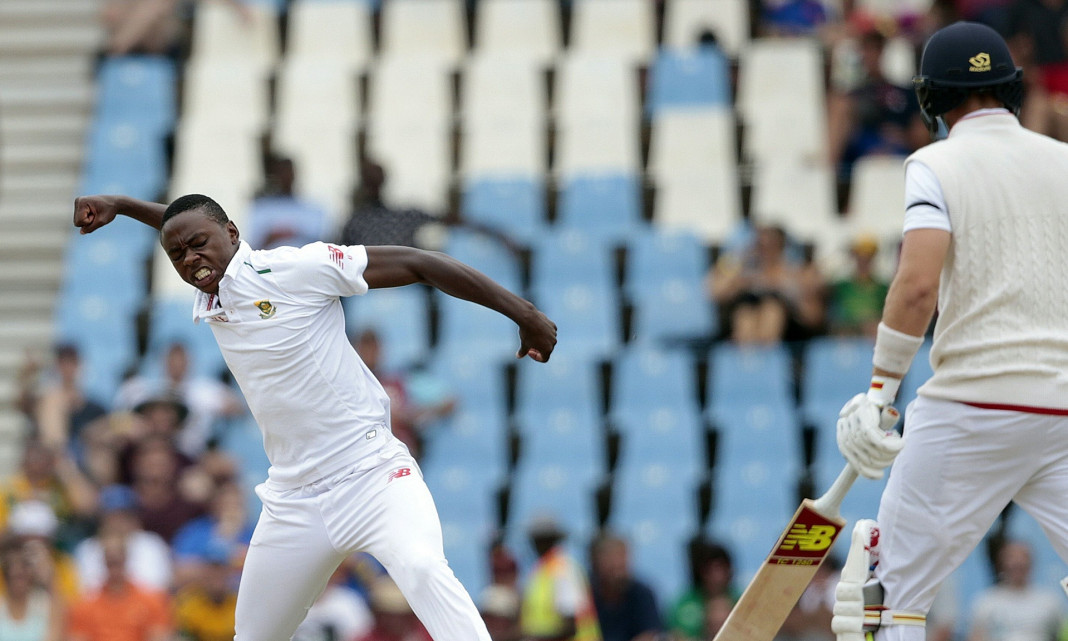Kagiso Rabada began the series against England waiting in the wings but he will now end it as the most significant player to emerge for defeated South Africa. On a gloomy, overcast third day of the fourth Test, it was the 20-year-old fast bowler who shone brightest with figures of seven for 112 in 29 overs in only his third Test on home soil.
“I don’t think I’ve arrived yet,” said Rabada, who felt his maiden five-wicket Test haul at the Wanderers last week was superior. “It felt good but, honestly, I didn’t think I bowled that well, just OK in spells. I’ll take it though, I’m happy.”
Lithe in action, probing in line and seemingly mature beyond his years, Rabada would add to the overnight scalps of Alex Hales and Nick Compton by gutting England’s middle order with three wickets in the space of 12 balls before lunch.
After lunch, and with the second new ball, Rabada had Ben Stokes caught at second slip for 33 when the all-rounder was threatening to explode once more – his favourite wicket for reasons he would not expand on – before Stuart Broad became his seventh victim when pulling to square leg.
Now on the verge of enjoying his first Test victory in his sixth appearance, the right-armer, who has played more matches in international cricket than first class, admits he is learning his trade fast at the highest level.
He said: “People kept telling me Test cricket is the real deal and I’ve learned that. You face good players who latch on to anything loose, so you have to bowl well for a long period, not just two overs. There’s the crowd too. I try and take the them out of my head and just see it as a normal cricket game with just me, the batsmen, the umpires and my team-mates on the field. I’ve learned a lot.”
South Africa do not play Test cricket again until New Zealand’s visit in August, by which time the shoulder injury to Dale Steyn that allowed Rabada in after Durban, and the torn ankle ligaments that have meant Vernon Philander has missed the entire series, should have long healed.
For Makhaya Ntini, who claimed 390 wickets in 101 Tests for South Africa between 1998 and 2009, Rabada’s 16 victims in the final three matches here have turned what used to be a self-selecting attack, when fully fit, into something of a headache for the selectors in the future.
“Their injuries opened the door to Kagiso but now it’s down to them to get him out. They can’t just come back and expect him to drop out. Now they need to do the hard work to win their places back,” Ntini said.
“He’s still young and fresh but he’s very strong – he will go very far in the game. There will be more tests to come for him as teams around the world look at him but at the moment he’s just showing such talent and maturity.”
That Rabada has impressed at Test level comes as little surprise, having stepped up to every challenge put before him his fledging career.
Six wickets in the semi-final of Under-19s World Cup against Australia in 2014, a hat-trick on his one-day international debut against Bangladesh last year in figures of six for 16, it has always been a case of when, not if, he would breakthrough in the longest form.
The pitches of India, where he made his debut last November, returned just two wickets in three Tests but the reports still came back positively, with the right-armer learning to harness reverse swing at the highest level and leading the attack.
For Ntini, the owner of South Africa’s best match figures of 13 for 132 and third on their list of all-time wicket-takers, Rabada has a fine career ahead.
“Test cricket is a game of records and I believe he can break all of them if he wants to. He’s the main positive to come out of this series for South Africa. It’s not just numbers on the board, it’s watching how he does it.”
























